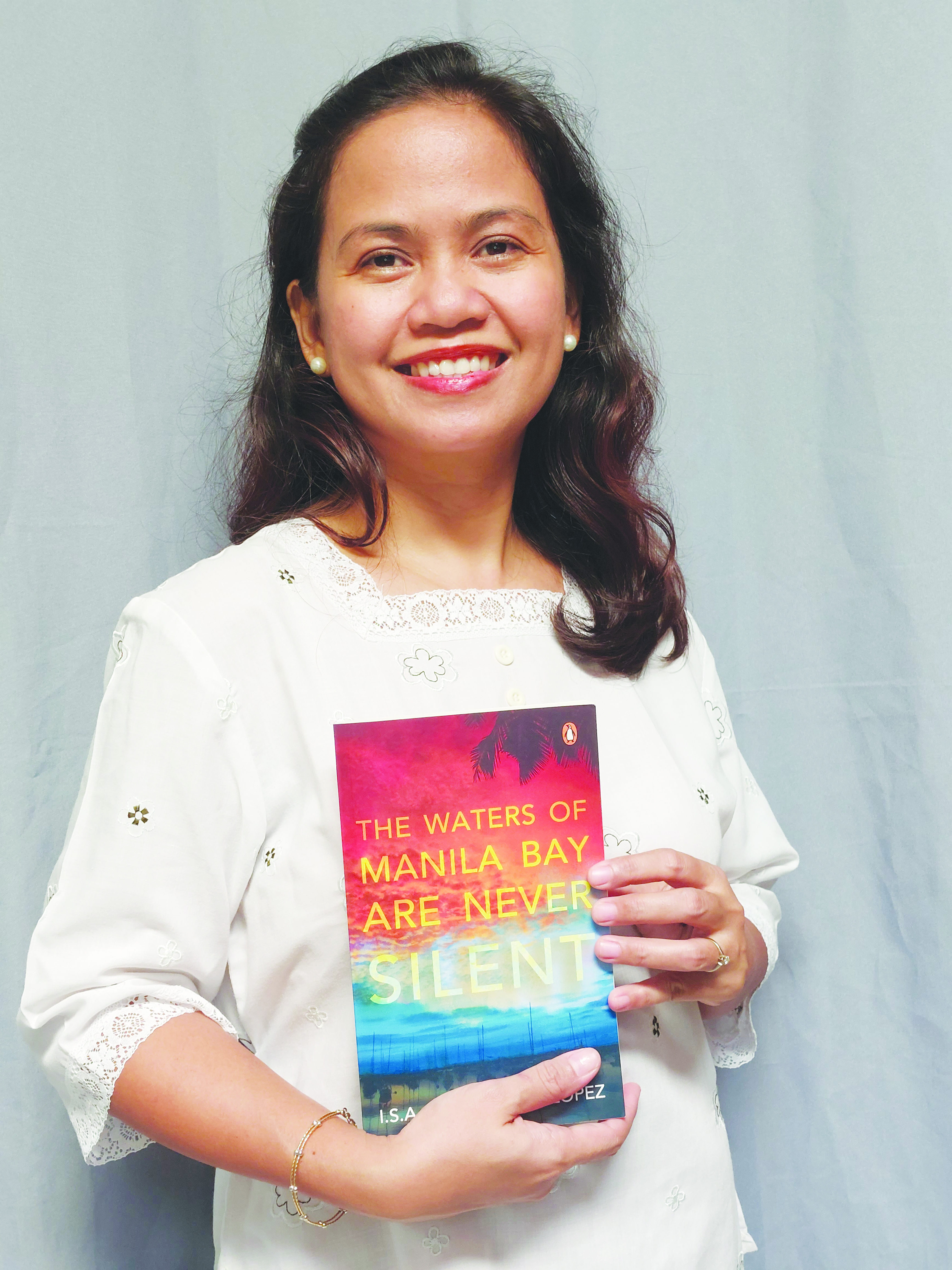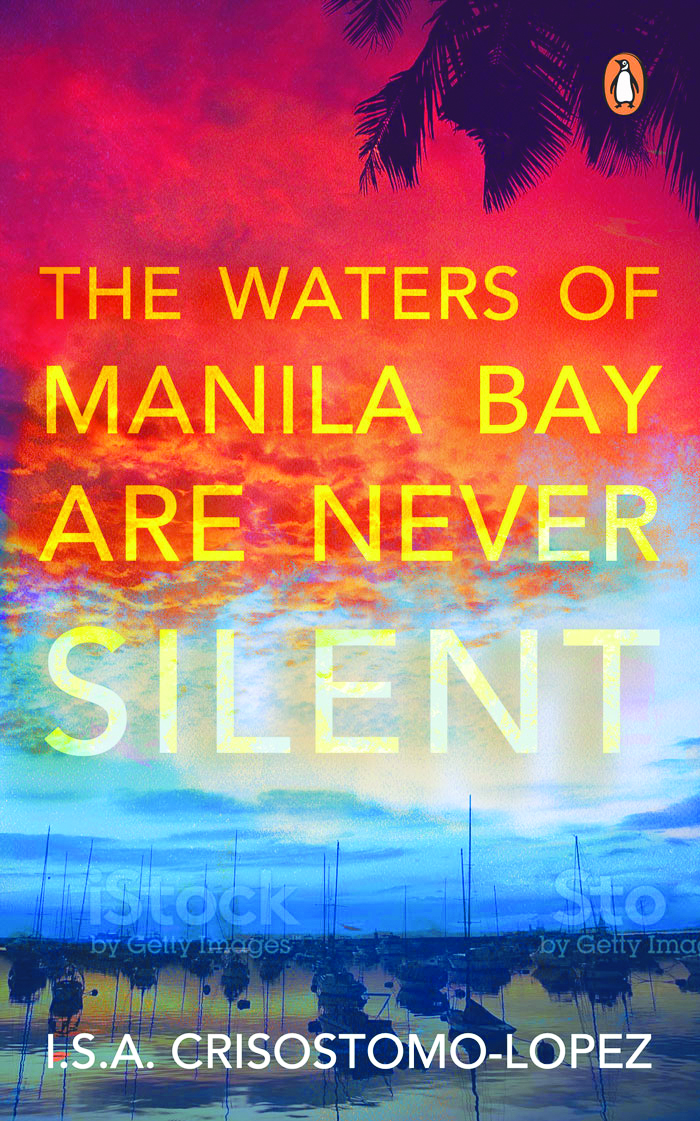This writer is never silent: Iris Sheila Crisostomo-Lopez, a mom of 4, pens a brave novel

Iris Sheila Crisostomo-Lopez, 48, a mother of four based in Biñan, Laguna, has launched a new fiction-thriller novel titled “The Waters of Manila Bay are Never Silent.” It is published by Penguin Random House SEA. This early, it is dubbed as a brave novel that “highlights the dangers faced by journalists, broadcasters, and other members of the press as they fulfill their tasks of bringing the news, forming public opinion, and championing the truth.”
According to a media statement on the book, the novel is “set against the backdrop of the previous administration’s anti-illegal drug campaign and revolves around the life of journalist and news editor named Zechariah 'Zeke' Dipasupil."
A summary of the novel states, “When an article about a boy who was killed after being tagged as a drug runner landed on his desk, Zeke felt it deserves to be on the front page. He empathizes with the dead boy whose cries were unjustly silenced, revealing his personal struggles since he also lost his voice as a child suffering from selective mutism. His quest for a follow-up article puts his life and his lady love in danger but it doesn’t deter him from seeking the truth.” This is the backdrop of the novel, which will have twists and turns as one flips each page.

When asked what inspired the idea for the novel, Iris said, “I’m always reminded by a quote from the late National Artist F. Sionil Jose, who said that writers must be an honest witness of their own time. The tokhang killings and the attacks against our journalists are something we cannot be silent about.”
Iris, my creative writing classmate during my master's studies at De La Salle University, gave me the opportunity to ask her eight questions. Here are her responses.
1: What do you currently do?
A: I’m a full-time wife, homemaker, and mother of four. I took my early retirement in 2016, after working for 15 years as a corporate communications officer of an insurance company. I write during my free time or in between house chores.
2. Your new book “The Waters of Manila Bay…” is said to be inspired by what’s happening in our country. Can you explain the reason why you wrote that book?
A: If we look around, or just by listening to the news, there's no denying we live in a dangerous society, not just for journalists. I think we all have our own horror stories of getting held-up or victimized by snatchers, scammers, and other dangerous people on the street. The story idea of my novel originated from various news that bothered me as a writer, a mother, and as a concerned citizen of my country.
What is even more unthinkable is that the perpetrators of the crimes usually get away with what they did. Something inside me won't watch and just keep silent. These stories, no matter how cruel or sad, deserve to be told even from a fictional point of view.
3. Of all the topics that you could use for your book, why this one?
A: Admittedly, the topic, although socially relevant, may not appeal to all audiences because of its highly political setting. But I took a chance to pitch the story to the publisher because I believe the topic is a story of the Filipino experience worth sharing with the world. I pitched it together with two other topics (one about Pagsanjan Falls and another about the pandemic). The publisher chose it among the three.
4. On a personal level, what inspired you to go into this genre? Or to write in general?
A. I love writing about things that move me emotionally. I'm more comfortable writing short stories than novels. If I may chart my writing journey, I started in high school writing love stories (on a typewriter!), then in college when I took communication arts, I wrote poems and essays in addition to short stories. When I took my master's in Creative Writing, I tried writing short stories with complex characters usually faced with a moral dilemma. I think I like experimenting on writing different stories every time, like the new one should be different from the previous.
5. Can you relay the experience of your first book being published? What was it? How was it published? How is the reception of the public?
A: My first book is a children's story about an old but lovable couple, "Si Lola Apura at si Lolo Un Momento." The characters were based on my parents who really are quite the opposite of each other. I pitched the manuscript to Adarna House in 2015 and it was accepted for publication. Since it was my very first book, the contract signing, the soft launch, the book signing, the storytelling sessions were all very memorable. During the book signing event at the Manila International Book Fair, I felt really honored to share the limelight with National Artist for Literature, Virgilio Almario. I am forever grateful to Adarna house for giving me the break. I think the book was well-received by readers since it has already been reprinted a few times since its initial release.
My next attempt to write was during the pandemic. I tried writing a science fiction novel for teenagers/ young adults titled, "58 Minutes in Driftland," which was independently-published on Amazon KDP. The novel had two more sequels and became a trilogy called the Driftland series. It was the first time for me to try self-publishing . It was fun but unlike traditional publishers, you have to market your own books, which is quite challenging.
6. How about “The Waters of Manila Bay…” what is its journey — from concept to publication?
A: This novel started as a short story with only 5,000 words. I wrote it as a contest entry, but it didn't win. Then I pitched the story idea to Penguin RH SEA through its submissions email. Five months later, I got an email from its publishers saying they were interested to publish my novel, with the condition that I make the story longer, up to 55,000 words. It was quite a tall order, but I was able to meet their requirements. I told my brain that a novel is really a compilation of short stories, where each chapter is a short story. So it's really a matter of writing one short story at a time, leading to a novel. The novel was released in Singapore in December 2022 and released in the Philippines in May 2023.
7. Why must Filipinos, especially the young ones, read “The Waters of Manila Bay…”?
A: Based on my observation on our young people, there is seemingly a lack of interest in current events, which can really be unsettling. I call it, "pagwawalang-bahala." I think young people should be more informed and involved. They must have a good knowledge of the past and the present to help them make good decisions moving forward. My novel, which mirrors present day issues facing our country, can be a good eye-opener.
8. Can you disclose a bit of your future plans? More books?
A: I have new stories for children already being reviewed by publishers. I also have started attending writing workshops to help me improve my craft and dig deeper wells for sources of motivation and inspiration. I hope to find homes for my stories — people who can reach more readers so they can read and appreciate who we are as a people and what we can offer to the world. As a writer, I hope that through my stories, I would be able to mirror the past, create a bridge for the present, and make the future something to look forward to.